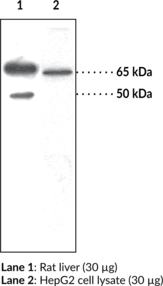Territorial Availability: Available through Bertin Technologies only in France
- Correlated keywords
- ACAT1 SOAT1 ER very low density lipoprotein TNF? IFN? THP1 H 4 A? 42 Apo E
- Product Overview:
Sterol O-acyltransferase 1 (SOAT-1), also known as acyl-coenzyme A:cholesterol acyltransferase-1 (ACAT-1), is an enzyme encoded by ACAT1 in humans that catalyzes the intracellular formation of cholesterol esters from cholesterol and long-chain fatty acyl-coenzyme A.{56232} It is ubiquitously expressed and localized to the rough endoplasmic reticulum where it preferentially utilizes oleic acid (Item Nos. 90260 | 24659) or palmitic acid (Item No. 10006627) as fatty acid substrates for the synthesis of cholesterol esters, which are stored intracellularly or packaged into chylomicrons or VLDL and secreted into the blood stream. SOAT-1/ACAT-1 protein levels are increased in macrophages under various pathological conditions, including atherosclerosis.{56233} SOAT-1/ACAT-1 activity is increased by cholesterol in vitro, and ACAT1 expression is increased by stimulation with the pro-inflammatory cytokines TNF-? or IFN-? in isolated human and THP-1 monocytes, respectively.{56234,56232} ACAT1 silencing in human H4 neuroglioma cells overexpressing amyloid-? precursor protein (APP) reduces secretion of soluble amyloid-? (A?) and A?42 (Item No. 20574).{56236} Genome-wide deletion of Acat1 reduces macrophage infiltration and neutral lipid deposition in atherosclerotic aortic lesions and decreases serum total cholesterol levels, but increases brain cholesterol deposition, in ApoE-/- mice fed a Western diet.{56235} Cayman’s SOAT-1/ACAT-1 Polyclonal Antibody can be used for immunoflouresence (IF) immunohistochemistry (IHC) and Western blot (WB) applications. The antibody recognizes the N-terminus to detect full-length SOAT-1/ACAT-1 at approximately 65 kDa from human, mouse, porcine, and rat samples.
Cayman Chemical’s mission is to help make research possible by supplying scientists worldwide with the basic research tools necessary for advancing human and animal health. Our utmost commitment to healthcare researchers is to offer the highest quality products with an affordable pricing policy.
Our scientists are experts in the synthesis, purification, and characterization of biochemicals ranging from small drug-like heterocycles to complex biolipids, fatty acids, and many others. We are also highly skilled in all aspects of assay and antibody development, protein expression, crystallization, and structure determination.
Over the past thirty years, Cayman developed a deep knowledge base in lipid biochemistry, including research involving the arachidonic acid cascade, inositol phosphates, and cannabinoids. This knowledge enabled the production of reagents of exceptional quality for cancer, oxidative injury, epigenetics, neuroscience, inflammation, metabolism, and many additional lines of research.
Our organic and analytical chemists specialize in the rapid development of manufacturing processes and analytical methods to carry out clinical and commercial GMP-API production. Pre-clinical drug discovery efforts are currently underway in the areas of bone restoration and repair, muscular dystrophy, oncology, and inflammation. A separate group of Ph.D.-level scientists are dedicated to offering Hit-to-Lead Discovery and Profiling Services for epigenetic targets. Our knowledgeable chemists can be contracted to perform complete sample analysis for analytes measured by the majority of our assays. We also offer a wide range of analytical services using LC-MS/MS, HPLC, GC, and many other techniques.
Accreditations
ISO/IEC 17025:2005
ISO Guide 34:2009
Cayman is a leader in the field of emerging drugs of abuse, providing high-purity Schedule I-V Controlled Substances to federally-licensed laboratories and qualified academic research institutions for forensic analyses. We are certified by ACLASS Accreditation Services with dual accreditation to ISO/IEC 17025:2005 and ISO Guide 34:2009.





